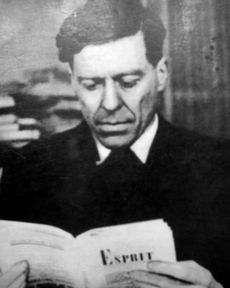In Western Europe, French thinker Emmanuel Mounier (1905-1950) developed personalism into a more political and activist movement. In 1932, he founded the periodical Esprit, which became the main outlet for personalism and attained great influence, not least in France.

As a young philosophy graduate in the early 1930s, Mounier was shocked by the financial collapse and the world order that caused such human suffering. This experience led him to the insight that human responsibility is not abstract and impersonal, but very concrete and personal.
Mounier sees the modern civilization as fundamentally derailed by materialism, individualism, and capitalism. He therefore calls for a nonviolent, cultural revolution to pave the way for a “total reconstruction of our civilization.”
A personalist society, according to Mounier, should aim to guarantee human rights and prevent the state and other institutions from violating the personal domains of human life. Positively defined, personalism wishes to organize society so as to develop in every level a maximum of initiative, responsibility, community, and decentralization.
Mounier sees the capitalist market economy as a good method for meeting our material needs, but he is an indignant critic of the all-encompassing dominance that capitalism has attained. Liberalism tends, in the name of freedom, to destroy freedom and initiative by handing them over to capitalist oppression. Collectivism protects society from being dominated by a particular interest, but has a tendency to bind freedom and concede power to just one party or social class. Personalism attempts to retain the collective as well as freedom through an economy in which, for instance, big industry consists of self-governing institutions, but within a mandate issued by society.
The program presented by Mounier for analyzing, breaking, and replacing the order of his time is put forward systematically in A Personalist Manifesto (1938) and Personalism (1952). He stresses that the program does not contain definitive solutions, but rather presents a way of thinking and living. Personalism is not a system; it is a perspective, a method, and a demand.
